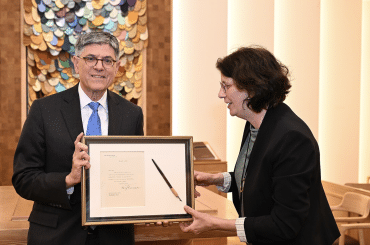I think Barack Obama is our Jesus, he’s going to save America. The surge of feeling called from the giant crowd I was in Saturday by this slender man as he skipped off the train at a whistlestop in Wynnewood, Pa., was Woodstock Nation feeling, the feeling of spiritual renewal, of a bottoms-up movement to bring my country back to her ideals. Amen.
That said, journalists should serve their readers; and I can’t help but talk about Obama’s dark side. I believe we’re all going to get to know it over the next eight years. Might as well start now.
Obama’s first book Dreams From My Father (1995) is a classic on race and identity–indeed, I can’t wait to blog about its implications for Zionism, Jewish identity, and foreign policy–but it’s also highly revealing psychologically. Obama begins the book by stating that he’s going to write "an honest account of a particular province of my life." That’s true, but also something of a stiff arm to the reader. I.e., this book is concerned with identity and paternity only; other provinces are none of the reader’s business.
Still, a psychic portrait comes through. Obama was abandoned by his father and, in a sense, abandoned by his mother too. When he was 10 or 11, she sent him back to Hawaii from Indonesia to live with his grandparents and go to Punahou School. Obama had great fondness for his grandparents, but he also saw right through them. He grew himself up. He has always been by himself in the world. This has made him strong and self-reliant, and there is an edge of mistrust, too. Like that sharp warning to the reader.
I’m not finished the book, but this detachment and mistrust are evident in the relationships he describes. Characters flit thru without any real hold on Obama, a couple of them knifed casually on the way out. His mother and grandparents come alive for a chapter or two and then he forgets about them, 100 pages on, and we have no idea how they’re faring. Halfway thru the book he quotes a long monologue he offered to Auma, his half sister from Kenya, visiting him in Chicago, about a white girl in New York who "I loved." Obama went out with the girl for a year, met her privileged family at their country home. The two broke up over racial issues. The story is beautifully told; Obama is an astonishing writer.
But it I found it weird and jarring to learn about this love affair nearly 100 pages after its actual place in the chronology, his New York chapters, when he had said nothing about it. And in a book filled with pseudonyms, the girl doesn’t even rate a pseudonym. I wondered whether Obama still pined for her. Also a little strange that in a racial narrative, in which Obama anatomizes his feelings about his blackness at many turns, he’s failed to tell us that he fell in love with a white woman.
As a writer, I am keen on reading acknowledgments, and that’s something else that struck me about Obama’s book: the acknowledgments, contained in his introduction, are very skimpy. He offers thanks to "my friends," but mentions only one by name. The others he thanks by name are his wife and two editors and his agent. (Among those he leaves out is Peter Osnos, a legendary New York editor and publisher, who had met with him and bought the book.)
I’m saying that Obama’s stingy about sharing credit. The most egregious instance of this is his description of taking a friend to the play, For Colored Girls Who Have Considered Suicide When the Rainbow Is Enuf, by the poet Ntozake Shange. Obama quotes three passages from the play, 18 lines in all. He does not say the name of the play or the author’s name. I only know that it’s Shange’s play because I googled a couple lines. Obama doesn’t even say it’s a play at first–but says it was "a meeting" he wanted to bring his friend to.
This is an insult to the writer whose words he’s borrowed; it goes against literary convention, and perhaps copyright law too. When you quote a writer, especially at length, you give the writer credit. There’s no mention of Shange’s name or play on the copyright page either. Weird.
In this piece in October 2006, Peter Osnos was sharply critical of how Obama conducted his literary affairs: "[H]e displayed ambition, real talent, luck, ruthlessness,
and, in my view, questionable judgment about using public service as a
personal payday." Osnos noted that this first book, which I adore, was published in 1995 and was "a modest success." (First editions sell for $1000 and up now.) Then nine years later Obama ran for the Senate in Illinois and gave the electrifying keynote speech at the 2004 Democratic convention. His book was reissued, became a bestseller. The "About the Author" page states: "Barack Obama is the U.S. senator from Illinois." Strange; he’s not the only senator. And Sen. Dick Durbin is senior. A little Oedipal, that.
"Now comes the part in which Obama showed a steely side and displayed an element of character which,
while completely legal and entirely within his rights as a writer,
makes me uneasy," Osnos wrote. After his book exploded, Obama dropped his literary agent, Jane Dystel, whom he had praised in Dreams From My Father‘s introduction for her "faith and tenacity," for Washington lawyer Robert Barnett, who also represents the Clintons. Obama wanted to pay an hourly rate rather than an agent’s 15 percent, Osnos speculates. Obama signed a multi-million-dollar, two-book deal in the interval between his election in November 2004 and his swearing-in in January, parlaying public service into personal gain in a way that Osnos criticizes–and that of course the Clintons cannot!
The best judge of political character I know, Peter Kaplan of the Observer, told me a year ago that Obama was great because he is cold. "And Jack Kennedy was cold, too." My own sense is that other individuals don’t fully register emotionally in Obama’s consciousness, they’re expendable, he’s arrogant, lacks empathy.
Which may, in fact, be the character of a great leader.

